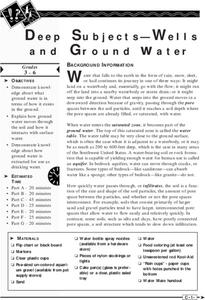University of Waikato
Constructing an Aquifer
Rainwater doesn't stay where it falls. Learners use modeling to demonstrate how rainwater disperses once it hits the ground. The activity includes an investigation of the height of the water table in an aquifer and how it is affected by...
NASA
The Case of the Wacky Water Cycle
Join the tree house detectives in learning about the processes of the water cycle, water conservation, water treatment, and water as a limited resource.
Curated OER
Deep Subjects - Wells and Ground Water
Here is a phenomenal lesson plan on ground water, wells, and aquifers. Young geologists study how water exists underground, how water moves through the soil, and how water is extracted to be used as drinking water. Some excellent...
Curated OER
What is an Aquifer?
Learners examine how an aquifer operates. They discuss the implications of the groundwater becoming contaminated. They work together to create an aquifer model to observe the connection between surface water and groundwater.
Curated OER
Aquifer Model
Students, after researching and brainstorming about aquifers and locating aquifer maps of Texas, participate in the building of a model of an aquifer complete with a pumping station. They also answer a variety of questions at the...
Curated OER
Land and People: Cape Cod Activity 1
Young scholars make a model aquifer to study the uniqueness of Cape Cod's ground-water system. Using the model., they determine how easily contamination spreads in the aquifer system by completing and recording three activities. Using...
Curated OER
Water: Naturally Cleaned
Learners use stream trays covered in different types of rocks or soil to investigate infiltrates and runoff. In this water pollution lesson, students work in groups with stream trays that have different substrates. They write a paragraph...
Curated OER
The Water Cycle
Students list the nine places on earth where water is found. They define the terms cycle and water cycle. Students explain how energy from the sun powers the movement of water molecules through the water cycle. They name and describe...
Curated OER
Groundwater as Part of the Water Cycle
Ninth graders study the effects of soil and rocks on filtering groundwater. In this groundwater lesson students complete a lab activity that includes sources of contamination.
Curated OER
Is Your Water Clean?
Students compare water quality of different sources. They test water samples for odor, phosphates, pH, bacteria, and dissolved solids. they fill out a data table and answer questions about their findings.
Curated OER
Plotting the Petroleum Plume
Eighth graders examine the difference between confining layers and aquifers in a basic water table aquifer scenario. They contour groundwater elevation and petroleum product thickness data.
Curated OER
Do You Drink It?
Young scholars explore the aquifer. They create a model of an aquifer and explain how a well works. Students explore the relationship between a well and the water table. They explore the various ways that groundwater becomes contaminated.
Curated OER
Making a Water Filter
Fifth graders draw a plan that they think will clean the sludge in a jar. Students construct the treatment system they designed, take a bottle of sludge to the system and try it out, writing down what happened.
Curated OER
Understanding Groundwater & the Effects of Pollution
Students complete a unit on the effects of pollution on our water supply. They create a graph to examine the density of earth's land surface, round the population to the nearest hundred million place, participate in a...
Curated OER
Groundwater Flow Demonstration Model
Students investigate the concept of groundwater that includes aquifers, groundwater flow, and the water table. They participate in activities using a flow demonstration model. Its use engages all types of learners because of its hands on...
Curated OER
Dilution and Concentration of Solutions
Future chemists practice laboratory techniques by creating a monochloramine solution. The objectives are to use of dilution, 9concentration, and measurement skills and to prepare a solution that will be used in a water treatment...
Curated OER
Underground Pollution
Fourth graders construct their own aquifer. They discover how water travels underwater and identifies sources of underground pollution. They record their observations and discuss the results.
Curated OER
The"Dirt" on Soil
Students examine the three different types of soil and their physical properties. In this soil lesson students design and implement a model of a water treatment plant.
Curated OER
Porosity
Students investigate the concept of an aquifer and use a 2 liter bottle and other materials to conduct a simple lab experiment or demonstration. They calculate the volume of water that can be stored in the aquifer. The lab is used to...
Curated OER
Solubility and Chemical Changes in Groundwater
Students test pH of water before and after it travels through different substrates (igneous pebbles and limestone) to detemine how soluble materials can affect groundwater. They answer questions such as: What happended to the pH of the...
Curated OER
Using Our Natural Resources Wisely
Students understand how ground water can be recycled to maximize its usage and begin to think about ways conservation can help Kansas preserve its natural resources in other areas - soil, minerals, and clean air.






















